Herbal tea basics
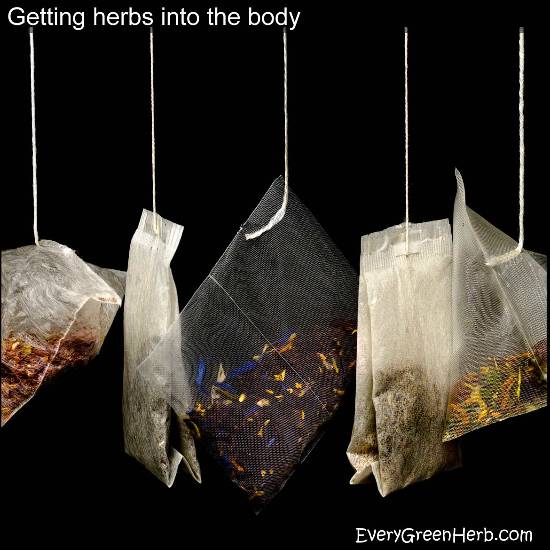
How to make herbal tea
Steep leaves and flowers in hot water! It is that easy.
Always use a glass, enameled, or stainless steel pot when making tea. Never make herbal teas in an aluminum or cast iron container since aluminum and iron can leech from the metal pots into your tea. Heavy metals can ruin the taste and destroy medicinal properties.
Should I drink herbal tea every day?
Yes! Drinking herbal teas is the easiest way to benefit from herbal medicine on a daily basis. Not only are teas easy to prepare, they are quickly absorbed by the body.
Even if you are not sick, herbal teas can build immunity and keep you healthy. Plus many of them taste delicious.
Where do I get herbal teas?
Teas are readily available in grocery stores, health food stores, and markets.
Herbal teas can be purchased already bagged or in loose-leaf form. Both are easy to use. With loose tea, you can let plant material sink to the bottom, or you can use a strainer.
Purchase blends of dried herbs or buy fresh plants like basil, rosemary, and sage and use them in your tea. Herbal teas come in all kinds of flavors and blends to suit every taste.
Use a variety of herbal teas morning, noon, and night to reap medicinal benefits.
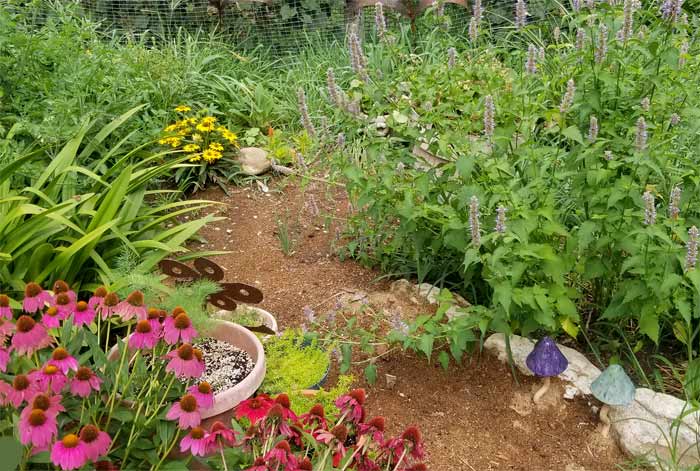
Grow your own herbs for tea.
Medicinal herbs for your teas can also be grown and used immediately or stored for winter use. The plants for making herbal tea may be harvested in the wild, but be sure not to pick protected plants or plants that have been sprayed with harmful chemicals.
Try different herbal teas until you find a few that you really like. My favorites are chamomile, spearmint, and burdock.
Drink tea every morning.
Herbal teas are useful all day long, but especially in the mornings. Wake up with a cup of green tea and lemon juice. English breakfast tea is also a good choice for tea drinkers.
Burdock with lime is also good in the mornings. The antioxidants in the tea will help rid the body of toxins and the citrus will get digestive juices flowing.
If you want coffee in the morning, that is fine. Freshly brewed coffee has many healing benefits! Note that when brewed coffee sits a while, harmful acids start to form. Coffee should always be made right before drinking it if possible.
If you drink coffee in the morning, then have a herbal tea or green drink before lunch, in the afternoon, or evening. As long as you get herbs into your body, the timing is not all that important.
Making tea is easy.
Herbs can bring great healing, and tea is an easy way to get the healing properties into your body. Try herbal teas to heal the body, mind, and spirit.
- To make herbal tea, bring water to a boil, add leaves, turn heat off and steep for a few minutes.
- Use a tight fitting lid on the pot so essential oils don’t escape.
- Thick leaves like mullein and comfrey may need to be simmered.
- Fragile flowers like chamomile, rose, and calendula petals should NOT be simmered.
- Pour hot water over flowers, strain into a cup, and sip slowly while inhaling the aroma.
- Cooking times, water temperature, and steeping are all things that you will learn the longer you practice herbal medicine.
- Every herb is different, if your tea is bitter, next time try a lower water temperature or steep for a shorter time period.
- It your tea is not strong enough, raise water temperature or steep longer.
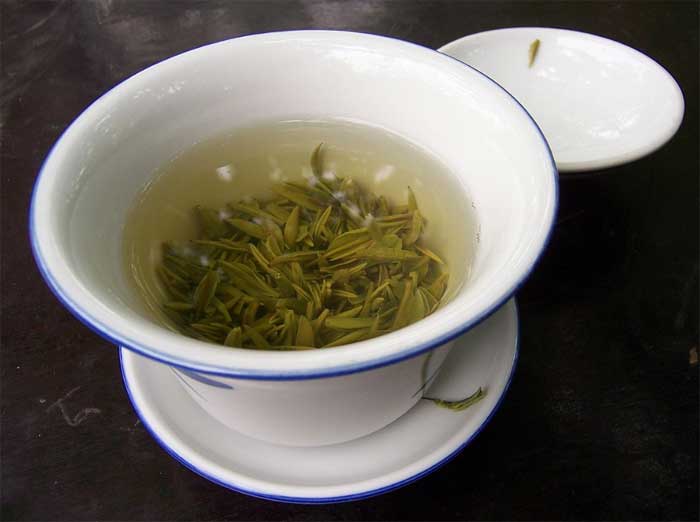
Water is important when making herbal teas.
Clean water is one of the most important things in life! When making medicinal teas, it is especially important to use the purest water you can find.
For the best taste, use mountain spring water. Well water, distilled water, and bottled waters are fine. Tap water in the United States is probably safe, too. Avoid using water that contains added chemicals like fluoride and chlorine.
More and more people are drinking herbal teas.
- Teas are a popular way to get the healing properties of herbs into the body.
- People use herbal teas because they are easy to prepare, they taste good, and they work to heal and protect!
- Quality herbal teas are readily available in a variety of flavors and blends.
- We offer a nice herbal blend with mullein, passion flower vine, chickweed, and other medicinal herbs in our online store. The blend is different each year depending on the harvest.
A few sips of herbal tea can revive the body.
Sometimes herbal teas are the only way to get the benefits of herbs into a weakened body. At first, give only a few sips at a time then gradually increase amounts.
If someone is too weak to drink water or tea, seek emergency help as soon as possible. Never force liquids, as they may get into the lungs. The last thing you want is to cause choking.
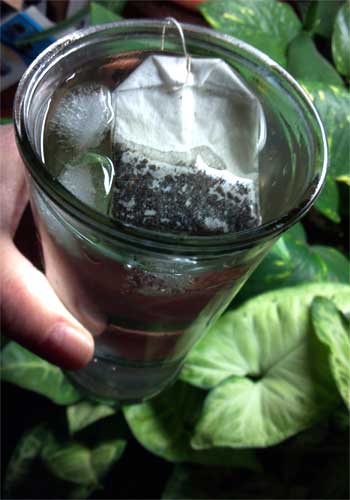
If you live in a hot climate, iced herbal tea is very refreshing. To extract the most from your tea bag or plant material, steep in hot water, cool, then pour over ice.
What is in herbal tea?
Herbal tea blends are made out of dried plant material including leaves, flowers, seeds, berries, bark, stems, roots and tubers.
Mint, basil, thyme, and other herbal teas are usually made from leaves.
Jasmine and other floral teas are made from flower petals.
Rose hip and juniper teas are made from seeds and berries.
Cinnamon, white oak, and wild cherry teas come from the inner bark of trees.
Dandelion tea can be made from the root, the leaves, or the flowers!
Try single teas before experimenting with different blends. This helps you to get to know individual herbs. After a while, you will be able to create blends like a pro.
Most teas, like mint and catnip, are safe for children but some are not. Do your research or consult a healthcare professional when treating children, pets, or the elderly.
Herbal teas made from plant leaves are known as infusions.
Herbal infusions are healing, and also work to flush toxins from the body.
Prepare green leaves for tea by tearing instead of cutting with a knife or scissors. Scissors cut across cell membranes and destroy some of the plant's special properties.
Cutting with sharp edges causes unnatural facets, loss of volatile essential oils, and reduced healing properties. Smaller leaves can be added to the water whole. Tearing by hand instead of slicing or chopping might seem silly, but it is worth it.
Dry leaves can be crumbled. No cutting or tearing is required.
Common herbs that are suitable for infusions include:
- Yellowroot
- Catnip
- Feverfew
- Borage
- Comfrey
- Dill
- Mullein
- Corn silk
- Mint
- Red clover
- Rosemary
- Sage
- Thyme
- Plantain
- Chickweed
- Cleavers
- Bee balm
Treat herbal plant material gently. Mild tasting herbs like chamomile become bitter if prepared at too high of a temperature.
Remember that plants are alive. They are gifts from God, so give thanks as you prepare them for use in herbal medicine.
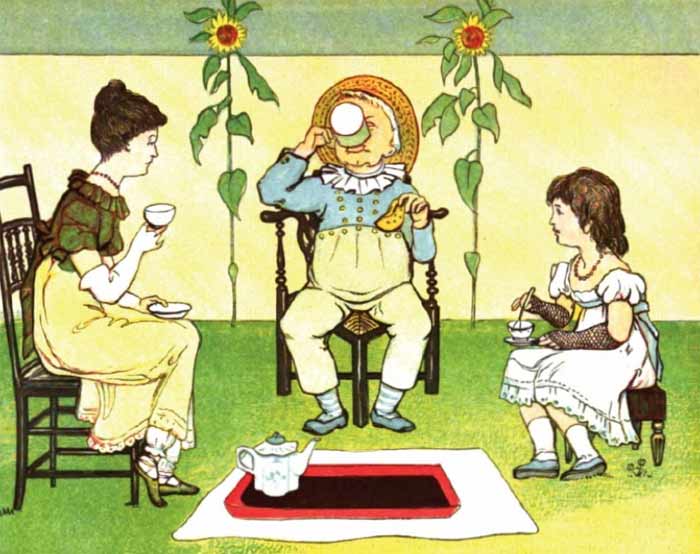
Herbal decoctions use bark and roots.
Herbal teas made from woody stems, roots, dried berries, seeds, and barks are called decoctions. Decoctions require a more vigorous method to extract the medicinal properties. Higher heat and longer cooking time is required.
Plant material should be crushed, mashed, or broken into small pieces. Boil for a few minutes, and then simmer for up to 15 minutes. Some decoctions will be ready in five minutes depending on desired strength.
Water will change color as decoction simmers. Make sure the pot is not aluminum and has a tight fitting lid. Strain into a pitcher or tea cup. Press plant material with the back of a spoon to extract more of the liquid.
More herbs that made good herbal teas include wild cherry bark, willow bark, cinnamon, dandelion root, ginger, ginseng, rose hips, and fennel seed.
Many roots like dandelion and yellowroot are naturally bitter.
Add mint, lemon peel, spices, stevia, licorice, or honey if desired to improve the taste of bitter tasting teas. I take bitter tea like medicine, by the tablespoon with an orange juice chaser.
Herbal tea tips
I like freshly made tea, but quart batches may be prepared. Sometimes, taking a few sips of medicinal tea every hour, is better than drinking a whole cup at once. It helps spread the dosing out over a period of time and keeps it in your system longer.
Of course, if drinking herbal tea for respiratory illness or when relaxing, sit back with your cup and enjoy it.
Inhaling the steam is a must when treating colds and flu naturally.
Many herbalists insist on reheating tea in a pan because they believe microwaves destroy healing properties. I agree. In fact, we quit using a microwave years ago and do not want one in our home.
Sometimes herbal teas and decoctions are served cool or over ice. They are still potent. All infusions and decoctions should be discarded after two or three days when liquid starts to loose its potency.
Use herbal teas on a daily basis.
Incorporate herbs into the diet throughout the day. Drink herbal teas whenever fatigue strikes.Try peppermint, ginger, cinnamon, ginseng, dandelion, nettle, milk thistle, plantain, red clover, rosemary, and fennel.
Use catnip, bee balm, or valerian to calm the nerves during stressful situations.
Why not just pop a herbal supplement in capsule form?
What is the best way to consume herbs? Tea or pills? In this video, Sarah Richards, owner of Homegrown Herb and Tea answers the question.
Relax before bedtime with teas and aromatherapy.
As bedtime approaches, it’s time for relaxing. Don’t exercise before bed or you won’t be able to sleep!
Drink relaxing herbal teas like chamomile, wild lettuce, catnip, and bee balm in the evenings. Warm herbal baths can also help calm the mind and relax the muscles.
Use lavender essential oil, rose essential oil, ylang-ylang essential oil, or jasmine essential oil in the bath for extra benefits.
Herbal sachets are good to put under your pillow. For sweet dreams and a sound sleep try a combination of lavender, passion flower, and lemon balm.
After a week or two of drinking herbal teas, taking herbal baths, and using more herbs in the kitchen, your whole outlook should be brighter. Herbs, when used on a daily basis, can really improve our lives.
Science and herbal teas
Scientific investigation of tea has been underway for over 30 years. Studies show that people who consume green tea on a regular basis have a lower rate of cancer.
Benefits of drinking tea come from the high content of polyphenols, which provide antioxidant, antiviral, and anti-inflammatory properties.
Inflammation is especially destructive to the body's organs and tissues. Herbs like green tea work to reduce inflammation which reduces the chances of obesity, cardiovascular diseases, neurodegenerative diseases, diabetes, arthritis, and cancer.
Green tea extract is shown to be an effective treatment for external genital warts. It has been approved as a drug for clinical therapy.
Tea polyphenols may also protect against prostate cancer. They work to inhibit angiogenesis, causing nutritional deficiency in tumor cells.
Herbal teas are used as a form of traditional medicine around the globe. They are used to treat everything from female problems to heart disease.
The most popular herbal teas include lavender, chamomile, fenugreek, stinging nettle, spearmint, hibiscus, yerba mate, echinacea, and various blends.
There are many ways to deliver herbs to the body.
Teas, infusions, decoctions, extracts, syrups, tinctures, infused oils, infused wine, inhalants, poultices, plasters, compresses, ointments, creams, lotions, liniments, baths, capsules, tablets, powders, lozenges, enemas, suppositories, astringents, gargles, washes, rinses, and essential oils all have a purpose in herbal medicine.
It is easy to make herbal products at home. For a healthy mind, body, and spirit, use them everyday!
*Always consult with your healthcare provider before using any herbal remedy especially if pregnant, nursing, or taking other medicines.
Sources:
https://www.ncbi.nlm.nih.gov/books/NBK92768/
https://pubmed.ncbi.nlm.nih.gov/31243622/
Blessings to you and yours!
Thanks so much for reading my blog. Jan.

*Note - the information on this website has not been evaluated by the Food and Drug Administration.
© 2005-2024 website design and content by Janice Boling